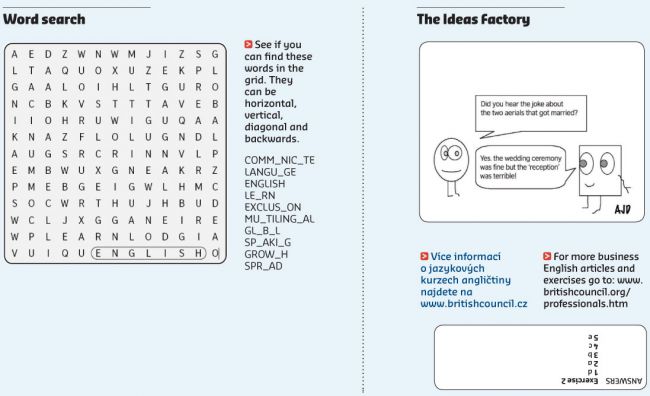The future of English by Graham Bradford
It has long been accepted that English is a global language, used in all corners of the world as a means of communication. In many parts of the world, English is regarded as a basic skill, which children learn at an early age so they can study through English later. The latest statistics tell us that these days around 80 per cent of spoken English is spoken between non-native English speakers. A Japanese businessman and his French client will conduct their communication in English. But while English is accepted as being the language of science and technology, what does the future hold for everyday speakers of English?
While linguists agree that the situation of English today is at a global all-time record, they do not necessarily agree on where the language is heading. Two of the world's leading experts on the English language, David Crystal and David Graddol, disagree on the path that English is likely to take.
David Graddol points out that although the number of people speaking English as a first language is rising, it is not rising as fast as the number of people speaking other languages around the world. He believes that English will soon be relegated to second place after Chinese and will be equal in dominance to Arabic, Hindi and Urdu. With 25 per cent of the world's population speaking English as a second language, David Crystal suggests that Graddol has underestimated the future dominance of English. He is keen to point out that nobody really knows what the future holds for English because at no other time in history has a language been in such a position. He draws attention to the escalating growth in the use of English between non-native speakers and sees no reason for this trend to stop.
Graddol thinks otherwise.While he does not dispute the fact that the number of people speaking English in the world is growing, he emphasises the fact that this is a recent trend. He disagrees with the idea that English will become a dominant world language to the exclusion of other languages. Just because people are learning English, it does not mean to say they are abandoning their own languages. They are instead becoming multilingual. He continues by suggesting that the growth of English is responsible for the spread of multilingualism and that native English speakers who are monolingual will necessarily become disadvantaged.
Regardless of which David you agree with, one thing is certain - the future of English is just around the corner and whichever direction it chooses to take, it will be difficult to ignore its impact.
Exercise 1
Comprehension: Correction. Correct the mistakes in this e-mail, which is a response to the article. The writer has misunderstood a few points. Find the four mistakes and correct them.
Dear Editor,
Your article was very interesting. It’s hard to believe that 50 per cent of spoken English is spoken between non-native English speakers. Both of the experts seem convincing. However, I find it difficult to believe that English will soon find itself second to Arabic or, as David Crystal says, that 25 per cent of the world’s population speak English as a first language. He also mentions the rapid growth in English spoken between native speakers.
Regards,
W. Smith
Correct version
Dear Editor,
Your article was very interesting. It is hard to believe that 80 per cent of spoken English is spoken between non-native English speakers. Both of the experts seem convincing. However, I find it difficult to believe that English will soon find itself second to Chinese or, as David Crystal says, that 25 per cent of the world’s population speak English as a second language. He also mentions the rapid growth in English spoken between non-native speakers.
Regards,
W. Smith
Exercise 2
Vocabulary: Collocations. Match a word from the first column (1 to 5) with a word from the second (a to e)
1 fashion
2 designer
3 popular
4 blatant
5 polic
a copyright
b trends
c copying
d bag
e editor
 Přidejte si Hospodářské noviny
mezi své oblíbené tituly
na Google zprávách.
Přidejte si Hospodářské noviny
mezi své oblíbené tituly
na Google zprávách.
Tento článek máteje zdarma. Když si předplatíte HN, budete moci číst všechny naše články nejen na vašem aktuálním připojení. Vaše předplatné brzy skončí. Předplaťte si HN a můžete i nadále číst všechny naše články. Nyní první 2 měsíce jen za 40 Kč.
- Veškerý obsah HN.cz
- Možnost kdykoliv zrušit
- Odemykejte obsah pro přátele
- Ukládejte si články na později
- Všechny články v audioverzi + playlist





